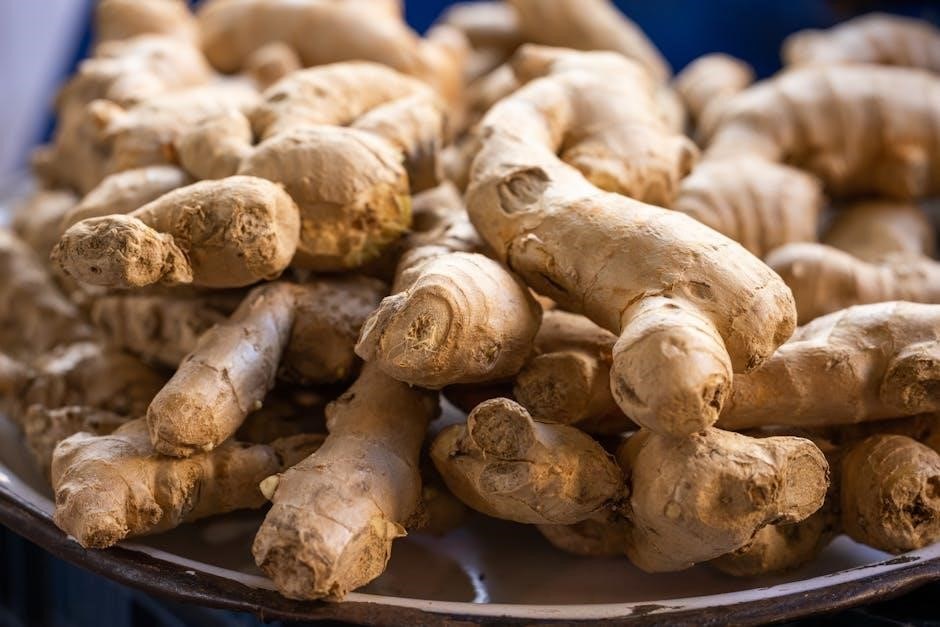
anti inflammatory food list pdf
Download your free anti-inflammatory food list PDF! Discover the best foods to reduce inflammation and improve your health. Easy to follow and print-friendly!
Anti-inflammatory foods are whole, nutrient-rich ingredients that help reduce chronic inflammation, promoting overall health and well-being. Incorporating these foods into your diet can alleviate symptoms of conditions like arthritis and improve mental health. A well-planned anti-inflammatory diet focuses on fruits, vegetables, whole grains, fatty fish, and healthy oils, while avoiding processed and sugary foods. Downloading a printable anti-inflammatory food list PDF can serve as a handy guide for making informed dietary choices and reducing inflammation naturally.
What Are Anti-Inflammatory Foods?
Anti-inflammatory foods are whole, minimally processed ingredients rich in antioxidants, fiber, and omega-3 fatty acids. They include fruits, vegetables, nuts, seeds, fatty fish, and healthy oils. These foods help reduce chronic inflammation by promoting a balanced immune response and protecting against oxidative stress. Examples like berries, leafy greens, and fatty fish are highlighted in the anti-inflammatory food list PDF, which guides users in making informed dietary choices to support overall health and reduce inflammation naturally.
Why Are Anti-Inflammatory Foods Important?
Anti-inflammatory foods are crucial for reducing chronic inflammation, which is linked to conditions like arthritis, heart disease, and mental health disorders. They promote gut health, boost antioxidants, and support immune function. Incorporating these foods into your diet can alleviate symptoms, improve mental clarity, and protect against chronic diseases. Using the anti-inflammatory food list PDF ensures you make informed choices, helping you maintain a balanced diet that fosters long-term well-being and reduces reliance on medications for inflammation management.
How to Use the Anti-Inflammatory Food List PDF
The anti-inflammatory food list PDF is a practical guide to help you incorporate beneficial foods into your diet. Print it for easy reference while meal planning or grocery shopping. Use it to identify anti-inflammatory options like fruits, vegetables, and whole grains, and avoid pro-inflammatory choices. The PDF categorizes foods, making it simple to make informed decisions. Share it with a friend or keep it handy to ensure you’re selecting nutrient-rich, inflammation-reducing ingredients. This tool helps you start and maintain a healthier, anti-inflammatory lifestyle effectively.

Benefits of an Anti-Inflammatory Diet
An anti-inflammatory diet offers numerous health benefits, including reduced chronic inflammation, enhanced mental clarity, and improved overall well-being. It helps prevent chronic diseases, supports a balanced gut microbiome, and promotes longevity. By focusing on nutrient-rich foods, this diet aids in managing conditions like arthritis and mental health disorders. These benefits collectively contribute to a healthier, more vibrant life.
Reduction in Chronic Inflammation
Chronic inflammation is a silent threat linked to various diseases. Anti-inflammatory foods, such as fatty fish, leafy greens, and berries, help reduce inflammation. Their antioxidants and omega-3 fatty acids combat oxidative stress. A diet rich in these foods can lower inflammatory markers, decreasing the risk of chronic conditions like heart disease and arthritis. Regular consumption of anti-inflammatory foods supports the body’s natural healing process, promoting long-term health and vitality.
Improvement in Mental Health
Chronic inflammation is closely linked to mental health issues like depression and anxiety. Anti-inflammatory foods, such as berries, nuts, and fatty fish, are rich in antioxidants and omega-3 fatty acids, which help reduce inflammation in the brain. By incorporating these foods into your diet, you can lower inflammatory markers associated with mental health conditions. This dietary approach promotes a healthier gut-brain connection, potentially improving mood and reducing symptoms of anxiety and depression, leading to better overall mental well-being.
Optimization of Gut Microbiota
A diet rich in anti-inflammatory foods supports gut microbiota balance by promoting the growth of beneficial bacteria and reducing harmful pathogens. Fiber-rich foods like fruits, vegetables, and whole grains act as prebiotics, feeding good bacteria and enhancing gut health. Fermented foods, such as yogurt and sauerkraut, introduce probiotics, further diversifying gut flora. Antioxidants in these foods also protect the gut lining from damage. A balanced gut microbiota reduces inflammation, improves nutrient absorption, and strengthens overall immune function, contributing to better health outcomes.
Protection Against Chronic Diseases
An anti-inflammatory diet plays a crucial role in reducing the risk of chronic diseases, such as heart disease, diabetes, and cancer. By incorporating foods rich in antioxidants, omega-3 fatty acids, and fiber, individuals can lower inflammation levels, which are often linked to disease progression. The Mediterranean diet, emphasizing fatty fish, fruits, vegetables, and whole grains, serves as a strong example of how dietary choices can protect against chronic conditions. This approach helps mitigate oxidative stress and inflammation, key contributors to long-term health issues.
Top Anti-Inflammatory Foods
Highlight key anti-inflammatory food categories, including fruits, vegetables, nuts, seeds, fatty fish, whole grains, spices, and fermented foods, each offering unique health benefits.
Fruits
Fruits are a cornerstone of an anti-inflammatory diet, offering abundant antioxidants and polyphenols. Berries like blueberries, raspberries, and strawberries are rich in anti-inflammatory compounds. Citrus fruits such as oranges and lemons provide vitamin C, which supports immune function. Apples and pomegranates are also potent anti-inflammatory options. These fruits help combat oxidative stress and reduce inflammation in the body. Incorporating a variety of colorful fruits into meals and snacks can enhance overall health and protect against chronic diseases. They are natural, nutritious, and versatile additions to any diet.
Vegetables
Vegetables are packed with anti-inflammatory properties, making them essential for reducing chronic inflammation. Leafy greens like spinach, kale, and arugula are rich in antioxidants and fiber. Cruciferous vegetables such as broccoli, Brussels sprouts, and cauliflower contain sulforaphane, which combats inflammation. Root vegetables like sweet potatoes and beets provide vitamins and minerals that support immune health. Incorporating a variety of colorful vegetables into your diet can help mitigate inflammation and improve overall well-being, making them a vital component of an anti-inflammatory lifestyle.
Nuts and Seeds
Nuts and seeds are rich in healthy fats, antioxidants, and fiber, making them excellent anti-inflammatory foods. Almonds, walnuts, and chia seeds are high in omega-3 fatty acids, which reduce inflammation. Flaxseeds and pumpkin seeds also provide anti-inflammatory benefits. Incorporating these into your diet can improve heart health and reduce chronic inflammation. They make great snacks or additions to meals, offering a natural way to support overall well-being and combat inflammatory processes in the body.
Fatty Fish
Fatty fish are a cornerstone of an anti-inflammatory diet, rich in omega-3 fatty acids like EPA and DHA. Salmon, mackerel, and sardines are top choices, as they effectively reduce inflammation and improve heart health. Regular consumption of fatty fish has been linked to lower levels of inflammatory markers and a reduced risk of chronic diseases. Including these fish in your meals helps combat inflammation naturally and supports overall well-being, making them a vital part of your anti-inflammatory food list.
Whole Grains
Whole grains, such as oats, quinoa, and brown rice, are rich in fiber and antioxidants, making them a key component of an anti-inflammatory diet. They help reduce inflammation by promoting gut health and stabilizing blood sugar levels. Incorporating whole grains into your meals can lower the risk of chronic diseases and improve overall well-being. Opt for unprocessed options like barley, farro, and whole wheat to maximize their anti-inflammatory benefits and support a balanced diet.
Spices and Herbs
Spices and herbs like turmeric, ginger, and cinnamon are potent anti-inflammatory agents. Turmeric contains curcumin, which reduces inflammation and improves joint health. Ginger has compounds that inhibit inflammatory pathways, while cinnamon helps lower inflammation in the body. These natural ingredients can be easily incorporated into meals, offering both flavor and health benefits. Adding them to your diet can enhance the effectiveness of an anti-inflammatory lifestyle, supporting overall wellness without the need for medications;
Fermented Foods
Fermented foods, such as sauerkraut, kimchi, kefir, and yogurt, are rich in probiotics and anti-inflammatory compounds. These foods support gut health by promoting a balanced microbiota, which is crucial for reducing inflammation. Fermentation enhances the bioavailability of nutrients and creates new anti-inflammatory molecules. Incorporating fermented foods into your diet can improve digestion, boost immunity, and lower chronic inflammation. They are versatile and can be easily added to meals, making them a valuable addition to an anti-inflammatory lifestyle.
Healthy Oils
Healthy oils, such as extra-virgin olive oil, avocado oil, and flaxseed oil, are rich in anti-inflammatory fats. These oils contain omega-3 fatty acids and antioxidants that help reduce inflammation and protect against chronic diseases. Using them in cooking or dressings supports heart health and improves digestion. Always opt for cold-pressed, unrefined varieties to ensure maximum nutritional benefits and incorporate them into your meals for a healthier, anti-inflammatory diet.

Foods to Avoid for Reducing Inflammation
Eliminate pro-inflammatory foods like red and processed meats, refined carbohydrates, and trans fats to reduce inflammation. Choose whole, unprocessed foods for better health;
Processed Foods
Processed foods are a major contributor to inflammation due to their high content of unhealthy fats, added sugars, and artificial additives. These foods, such as packaged snacks, frozen meals, and processed meats, often contain pro-inflammatory ingredients that can trigger chronic inflammation. Regular consumption of processed foods is linked to various health issues, including cardiovascular diseases and metabolic disorders. Limiting or avoiding these foods is crucial for maintaining a balanced anti-inflammatory diet and overall health.
Sugary Drinks and Snacks
Sugary drinks and snacks are key contributors to inflammation, as they cause rapid spikes in blood sugar and insulin resistance. These high-sugar foods and beverages promote the production of pro-inflammatory molecules, increasing the risk of chronic conditions like obesity and diabetes. Regular consumption can lead to persistent low-grade inflammation, which is detrimental to long-term health. Reducing intake of sugary items is essential for an effective anti-inflammatory diet, helping to mitigate inflammation and support overall well-being.
Red and Processed Meats
Red and processed meats are linked to increased inflammation due to their high saturated fat and sodium content. Preservatives like sodium nitrate in processed meats can trigger inflammatory responses, raising chronic inflammation risks. Regular consumption is associated with conditions like heart disease and certain cancers. Limiting these foods is crucial for an anti-inflammatory diet, helping to reduce inflammation and promote better overall health and well-being.
Fried Foods
Fried foods are high in calories, fat, and sodium, contributing to inflammation. They often contain trans fats, which can trigger inflammatory responses in the body. Regular consumption is linked to chronic conditions like obesity and heart disease. Avoiding fried foods is essential for an anti-inflammatory diet, helping to reduce inflammation and improve overall health. Opt for baked, grilled, or steamed alternatives to minimize harmful effects and support a balanced, inflammation-reducing lifestyle.
Refined Carbohydrates
Refined carbohydrates, such as white bread, pasta, and pastries, cause rapid spikes in blood sugar and insulin levels, promoting inflammation. These foods are stripped of fiber and nutrients, contributing to chronic inflammation and conditions like diabetes. Limiting refined carbs and choosing whole grains instead helps reduce inflammation and supports overall health. A balanced diet with complex carbs is crucial for maintaining an anti-inflammatory lifestyle and preventing long-term health issues.
Tips for Incorporating Anti-Inflammatory Foods
Start with meal planning, incorporating anti-inflammatory foods like fruits, vegetables, and whole grains. Use spices like turmeric and ginger, and keep healthy snacks like nuts and berries on hand.
Meal Planning Strategies
Planning meals with anti-inflammatory foods is essential for maintaining a balanced diet. Start by creating a weekly menu that includes a variety of fruits, vegetables, whole grains, and fatty fish. Incorporate leafy greens like spinach and kale, colorful vegetables such as bell peppers and carrots, and whole grains like quinoa and oats. Add protein sources like salmon, lentils, and black beans for diversity. Use spices like turmeric and ginger to enhance flavor and inflammation-fighting properties. Consider batch cooking to save time and ensure consistent nutrition throughout the week. Refer to your anti-inflammatory food list PDF for inspiration and guidance on selecting the best ingredients. By organizing your meals in advance, you can simplify grocery shopping and reduce the temptation to choose less healthy options. This structured approach helps in maintaining a diet rich in nutrients and antioxidants, which are crucial for reducing inflammation and improving overall health.
Snack Ideas
Snacking on anti-inflammatory foods can help maintain a healthy diet between meals. Opt for options like mixed nuts, especially walnuts and almonds, which are rich in omega-3 fatty acids. Fresh or dried berries, such as blueberries and raspberries, provide antioxidants and fiber. Sliced avocado on whole-grain toast or a handful of dark chocolate (70% cocoa or higher) are also excellent choices. Pairing apple slices with almond butter or enjoying a small portion of seeds like chia or flaxseed can offer a satisfying and inflammation-reducing snack. These nutrient-dense options support overall well-being and reduce inflammation. Use your anti-inflammatory food list PDF for more creative and healthy snack ideas.
Cooking with Anti-Inflammatory Spices
Incorporating anti-inflammatory spices into your meals can enhance flavor while reducing inflammation. Turmeric, with its active compound curcumin, is a powerful anti-inflammatory agent and can be added to soups, stir-fries, or roasted vegetables. Ginger, another potent option, can be grated into teas, stir-fries, or baked goods. Cinnamon and cayenne pepper also offer anti-inflammatory benefits and can be sprinkled on oatmeal, yogurt, or used in marinades. These spices not only elevate dishes but also support overall health. Refer to your anti-inflammatory food list PDF for more spice options and recipe ideas.

The Science Behind Anti-Inflammatory Diets
Anti-inflammatory diets work by reducing inflammatory markers through antioxidants, omega-3 fatty acids, and fiber, naturally promoting a healthier gut microbiome, which helps improve overall well-being holistically.
Role of Antioxidants
Antioxidants are molecules that neutralize free radicals, reducing oxidative stress and inflammation. Foods rich in antioxidants, such as berries, leafy greens, and nuts, play a crucial role in combating chronic inflammation. By protecting cells from damage, antioxidants help lower the risk of diseases linked to inflammation, including heart disease and mental health disorders like depression. Incorporating antioxidant-rich foods from the anti-inflammatory food list PDF can significantly enhance your diet’s ability to reduce inflammation and promote overall well-being.
Impact of Omega-3 Fatty Acids
Omega-3 fatty acids, found in fatty fish like salmon and mackerel, are potent anti-inflammatory agents. They inhibit the production of pro-inflammatory proteins, reducing inflammation and alleviating conditions like arthritis. These fats also support heart health and brain function. Including omega-3-rich foods from the anti-inflammatory food list PDF can help mitigate chronic inflammation and promote overall well-being by addressing both physical and mental health challenges.
Importance of Fiber
Fiber plays a crucial role in reducing inflammation by optimizing gut microbiota and promoting a healthy digestive system. Found abundantly in whole grains, fruits, and vegetables, fiber helps lower inflammatory markers and reduces the risk of chronic diseases. A high-fiber diet supports the growth of beneficial gut bacteria, enhancing immune function and overall well-being. Incorporating fiber-rich foods from the anti-inflammatory food list PDF can significantly contribute to a balanced and inflammation-reducing diet, fostering long-term health benefits.
Lifestyle Factors Beyond Diet
Beyond diet, exercise, hydration, and stress management are vital for reducing inflammation. Regular physical activity and proper hydration support immune function, while stress reduction techniques like meditation can further alleviate inflammation and improve overall well-being.
Exercise and Inflammation
Regular exercise is a key factor in reducing inflammation. Physical activity helps lower chronic inflammation by improving circulation, strengthening the immune system, and promoting weight management. Moderate-intensity exercises like walking, cycling, or swimming are particularly effective. Exercise also enhances the body’s natural anti-inflammatory responses, which can help alleviate symptoms of conditions like arthritis. Combining regular physical activity with a balanced diet rich in anti-inflammatory foods further amplifies these benefits, supporting overall health and well-being.
Hydration and Its Role
Proper hydration is essential for maintaining bodily functions and reducing inflammation. Water helps flush out toxins, lubricate joints, and support the immune system. Even mild dehydration can exacerbate inflammatory responses, while adequate hydration promotes healing and overall health. Including water-rich foods like cucumbers and watermelon, alongside herbal teas, can enhance hydration levels. Staying hydrated complements an anti-inflammatory diet, aiding in the prevention of chronic inflammation and supporting mental clarity and physical performance.
Stress Management Techniques
Chronic stress triggers inflammation by activating the body’s stress response, releasing cortisol and other inflammatory markers. Effective stress management techniques, such as meditation, yoga, and deep breathing exercises, can help mitigate this response. Adequate sleep, time management, and engaging in hobbies also play crucial roles in reducing stress. Combining these practices with an anti-inflammatory diet enhances their benefits, fostering a holistic approach to health and reducing the risk of chronic inflammation and related mental health issues like anxiety and depression.
Managing Chronic Inflammation
Chronic inflammation can lead to serious health issues, but lifestyle changes like diet, exercise, and stress management can help reduce it. An anti-inflammatory diet, rich in fruits, vegetables, and whole grains, plays a key role in minimizing inflammation and improving overall health.
Understanding Acute vs. Chronic Inflammation
Acute inflammation is a short-term, natural response to injury or infection, aiding healing and protection. Chronic inflammation, however, is a prolonged, low-grade response that can damage tissues and contribute to diseases like arthritis and heart disease. While acute inflammation resolves quickly, chronic inflammation persists due to factors like poor diet, stress, or underlying health conditions. Understanding this distinction is crucial for implementing dietary changes, such as using an anti-inflammatory food list PDF, to manage and reduce chronic inflammation effectively.
Lifestyle Changes for Reducing Inflammation
Adopting a holistic approach to reduce inflammation involves dietary adjustments and other lifestyle modifications. Regular physical activity, such as walking or yoga, can lower inflammation markers. Staying hydrated with water and herbal teas supports bodily functions. Managing stress through meditation or deep breathing exercises also plays a role. Ensuring adequate sleep is crucial, as poor sleep can exacerbate inflammation. These changes, combined with an anti-inflammatory diet guided by a food list PDF, create a comprehensive strategy to mitigate chronic inflammation and improve overall health.

Mental Health and Inflammation
Chronic inflammation is linked to mental health issues like anxiety and depression. An anti-inflammatory diet, guided by the food list PDF, can help reduce these symptoms.
Link Between Inflammation and Depression
Chronic inflammation has been closely linked to depression, as it disrupts brain function and neurotransmitter balance. Elevated inflammatory markers, such as cytokines, can impair mood regulation and contribute to depressive symptoms. Studies show that individuals with chronic inflammation are more likely to develop depression. Addressing inflammation through diet, such as using an anti-inflammatory food list PDF, may help alleviate symptoms and improve mental health outcomes. This connection highlights the importance of dietary interventions in managing both inflammation and depression.
Impact on Anxiety
Chronic inflammation can significantly impact anxiety levels by altering brain chemistry and nervous system function. Inflammatory markers, such as cytokines, can increase the production of stress hormones like cortisol, exacerbating anxiety symptoms. Research indicates that individuals with higher levels of inflammation are more prone to anxiety disorders. Incorporating anti-inflammatory foods, as outlined in the anti-inflammatory food list PDF, may help reduce these markers and promote a calmer mental state, offering a dietary approach to managing anxiety effectively.
Dietary Interventions for Mental Health
Dietary interventions focusing on anti-inflammatory foods can significantly support mental health by reducing inflammation and promoting brain function. Foods rich in omega-3 fatty acids, antioxidants, and fiber, such as fatty fish, berries, and whole grains, have been shown to improve symptoms of depression and anxiety. The anti-inflammatory food list PDF provides a comprehensive guide to these beneficial foods, helping individuals make informed choices to enhance their mental well-being through nutrition. Regular consumption of these foods may aid in managing mental health conditions naturally.
Accessing the Anti-Inflammatory Food List PDF
The anti-inflammatory food list PDF is a downloadable guide that categorizes foods by their anti-inflammatory properties, making it easy to plan meals and grocery shop. This printable resource helps users identify beneficial foods and avoid inflammatory ones, supporting a healthier diet and lifestyle. It’s available online for free and serves as a handy tool for managing inflammation and improving overall well-being through informed dietary choices.
Downloading the Printable List
Downloading the anti-inflammatory food list PDF is a simple process that provides instant access to a comprehensive guide. This printable resource is free and readily available online, allowing users to plan meals, grocery shop, and track their dietary choices effectively. By downloading the PDF, individuals can easily identify anti-inflammatory foods, avoid inflammatory ones, and make informed decisions to support their health journey. It’s a convenient tool for anyone aiming to reduce inflammation and enhance overall well-being through nutrition.
Using the List for Grocery Shopping
The anti-inflammatory food list PDF is an excellent tool for grocery shopping, helping users make informed choices. It categorizes foods into anti-inflammatory and inflammatory options, guiding shoppers toward healthier selections. By referencing the list, individuals can stock their pantries with nutrient-rich ingredients like fruits, vegetables, and whole grains, while avoiding processed items. This organized approach simplifies meal planning, ensures balanced nutrition, and supports a lifestyle aimed at reducing inflammation and improving overall health effectively.
Embracing an anti-inflammatory diet is a powerful step toward better health. With the provided PDF list, you can easily incorporate beneficial foods into your meals, reducing inflammation and enhancing well-being. Start your journey today for a healthier tomorrow!
Final Thoughts on Anti-Inflammatory Diets
Adopting an anti-inflammatory diet is a proactive approach to managing inflammation and enhancing overall health. By focusing on whole, nutrient-dense foods like fruits, vegetables, and fatty fish, individuals can reduce chronic inflammation, improve mental clarity, and protect against chronic diseases. The anti-inflammatory food list PDF serves as a valuable resource, offering a clear guide to making informed dietary choices. Consistency and gradual changes are key to experiencing the long-term benefits of this dietary approach.
Encouragement to Start Your Journey
Embracing an anti-inflammatory lifestyle is a powerful step toward better health. Start by incorporating one or two anti-inflammatory foods into your daily meals and gradually expand your repertoire. The printable anti-inflammatory food list PDF is a great tool to guide your grocery shopping and meal planning. Remember, small changes add up over time. Take control of your health today and experience the transformative benefits of an anti-inflammatory diet for yourself.